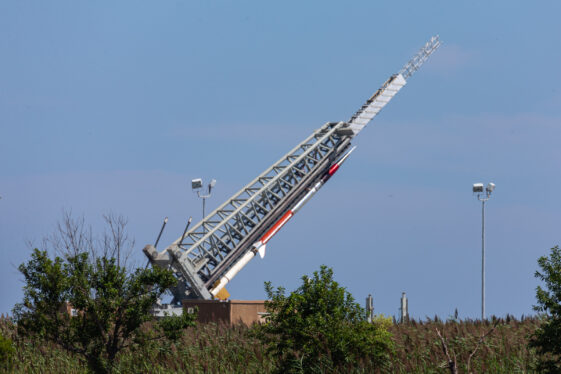4 min read
Preparations for Next Moonwalk Simulations Underway (and Underwater)
NASA’s Wallops Flight Facility in Virginia is scheduled to launch a sounding rocket carrying student-developed experiments for the RockSat-X mission on Tuesday, Aug. 13.
The Terrier-Improved Malemute rocket is expected to reach an altitude of about 100 miles (162 kilometers) before descending by parachute into the Atlantic Ocean to be recovered. The launch window for the mission is 6 a.m. to 9 a.m. EDT, Aug. 13, with backup days of Aug. 14, 15, and 16. The Wallops Visitor Center’s launch viewing area will open at 5 a.m. for launch viewing. A livestream of the mission will begin 15 minutes before launch on the Wallops YouTube channel. Launch updates are also available via the Wallops Facebook page. The launch may be visible in the Chesapeake Bay region.
The rocket will carry experiments developed by nine university and community college teams as part of NASA’s RockSat programs.
“The RockSat program provides unique hands-on experiences for students in the development of scientific experiments and working in teams, so these students are ready to enter STEM careers,” said Dr. Joyce Winterton, Wallops senior advisor for education and leadership development.
RockSat-X 2024 Flight Projects
- The University of Alabama Huntsville is flying two primary experiments:
- Joint Union of Payload Information and Technology between Experiments and Rockets (JUPITER), a custom spacecraft bus-like system that connects experiment hardware with existing launch vehicle electronics.
- SwingSat will increase the technology readiness level of momentum exchange tether technology in the context of satellite constellation deployments.
- The University of Alberta will demonstrate instruments for characterizing plasma wave activity and electron microburst precipitation, specifically by resolving precipitating relativistic and sub-relativistic electrons. The project will be capable of measuring magnetic plasma wave oscillations, including chorus waves and ground-based Very Low Frequency transmitters. The outcome of this mission will improve the Technology Readiness Level.
- Clemson University’s experiment will measure electron density and temperature of the E region ionosphere, between 56- 93 miles (90-150 kilometers).
- The College of the Canyons experiment will deploy three capsules to gather data on greenhouse gases in the upper atmosphere to aid in the fight against climate change.
- The Community Colleges of Colorado, a collaboration of Arapahoe and Red Rocks Community Colleges, aims to evaluate how microgravity affects the mechanical properties of lunar regolith simulants sintered during suborbital flight. The mission will also create a cost-efficient star tracker using off-the-shelf materials and open-source software.
- Northwest Nazarene University is testing a space-rated robotic arm capable of tracking and capturing objects. The arm will deploy and catch three balls, then stow itself for reentry, and will also capture video footage of all the catch attempts.
- The University of Puerto Rico will collect environmental data of the atmosphere using humidity, temperature, and pressure sensors. Using an Ultra High Frequency antenna, telecommunications will use open-source protocols to beam down data to ground stations at Wallops. Uninterrupted Virtual Reality footage of flight will be used for STEM engagement.
- Virginia Tech’s experiment tests a space tether that provides a small CubeSat with power and a mechanical connection.
- West Virginia Space Collaboration, a collaboration of five West Virginia universities, will conduct nine independent experiments flying on the 2024 RockSat-X mission. Included are:
-
- Lower Ionosphere Electric Field Double Probes (LIEF), which will study plasma and electric field densities throughout the flight.
- A mycelium properties experiment that will study the mechanical properties of mycelium under space flight conditions.
- A flight dynamics module that will record data on rocket and space flight conditions.
- A Geiger counter to detect radiation density during flight.
- A heat study that will analyze heat dissipation during space flight and reentry.
- A study on the effect of spaceflight on microbes in soil during flight and reentry.
- Power generation using type K thermocouples.
- Spectrometric and photographic data of the Sun.
- Creation of a 3D model of flight using LiDAR tracking and flight data.
NASA’s Sounding Rocket Program is conducted at the agency’s Wallops Flight Facility, which is managed by NASA’s Goddard Space Flight Center in Greenbelt, Maryland. NASA’s Heliophysics Division manages the sounding rocket program for the agency.











